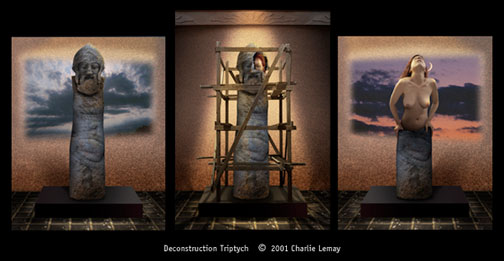 |
| By Jenny Singer
IF YOU want to understand the true meaning of the Pagan holiday called Samhain (pronounced Sa-wane), skip the local Hallmark store selling the idea of tricks and treats. Go right to the Bible, from which the above words were adapted. When you are done reading the Bible, find a Buddhist and ask about the holiday they call Obon, a time when the Japanese hang lanterns in front of their houses to guide the spirits of their ancestors. Go to a synagogue on Yom Kippur if you are Jewish and participate in their ceremony for the dead called the Yizhor. Join Koreans on the 15th day of the eighth lunar month, when they begin the day by offering food to the dead for the onset of their Harvest Moon Festival. On November 2nd join Mexicans to celebrate "The Day of the Dead." Mexicans understand that death is as much a part of life as is living. Death is every bit as real as life. Even the Christians celebrate All Saints Day, when all the martyred Saints are honored and remembered. The ancient Celtic calendar is divided into two major times of the year. The summer honors life and is a time of light and fertility, while the winter is known as "The Dark Time" and honors death. Samhain marks the turning of the wheel of seasons and is the eve of the Celtic winter, which begins November 1st. Samhain is the Celtic version of New Year's Eve. Historically it was the time of year when final preparations were being made for the winter, harvesting anything that was left in the fields. In addition, the ancients assessed their livestock and decided what animals were to be slaughtered and preserved for the food that would be eaten during the many cold months to come. The Celts knew that they could only sustain the smallest of herds in the coming months. It is really important to understand that this was a very serious time. The winters were cold and harsh and the mortality rate was very high. Medicines in the days of old were made with herbs and were prepared for the inevitable illnesses to come. Samhain is also a time of year when divination would be performed. Because the veil between the worlds was so thin it was an excellent time to inquire into what the winter would bring. Putting it in the context of the ancients, one could see how important knowing what possibilities the winter would hold in store for them and the assistance it would provide them in avoiding potentially fatal mistakes. It helped them prepare and survive. The reasons they used divination in those days is very simple. It was their science. Divination is a form of a prori reasoning. In other words one can assess somewhat from the past winters what is to come in the following ones and thus by being observant find ways to steer clear of danger. In terms of astrology this is the ideal time of year to do peoples charts. Samhain, is a time to commune with the dead. The ancient Celts and modern Wiccan's acknowledge that the dead can in essence rise from what appears to be the condition or illusion of death. It is the time when the veil between those who are living and those who are dead is the thinnest. It is a time to invite the dead in to share our food and company. One tradition is called a "Dumb" or Silent Supper. Ceremonies are performed in honor of those we love who have passed into Summerland or the land of the dead. A place at the table for the departed is set with offerings of bread and wine so that the dead may feast. Supper is eaten in silence, while remembering the ones we love. It is very possible that given the proper atmosphere the dead will walk through the veil to dine in our company. Usually it is someone we have known, although at times it is possible that a stranger might visit us as well. It is a time to treat all souls who walk through the veil with tenderness for they are not dead at that moment yet not alive either. They are in between the worlds. The thinning of the veil makes Samhain a powerful time in which to deal with the past and issues of communication with those who have died. It is the perfect time to have that conversation you never had with a beloved friend or relative. Say the things that you wish you had. Those who have left their bodies are with us and they will hear you. And remember: No matter how dark, cold and harsh the winter might seem the wheel will continue to turn. When Beltane and Spring arrives you will know the true meaning of the joy of being alive. You will make love in the fields and fertilize the crops and bless them with your love knowing that your blessings will assure a bountiful harvest when the wheel turns once again.++ This article was adapted into the essay Unbroken Chain at StarIQ.com |
|
|